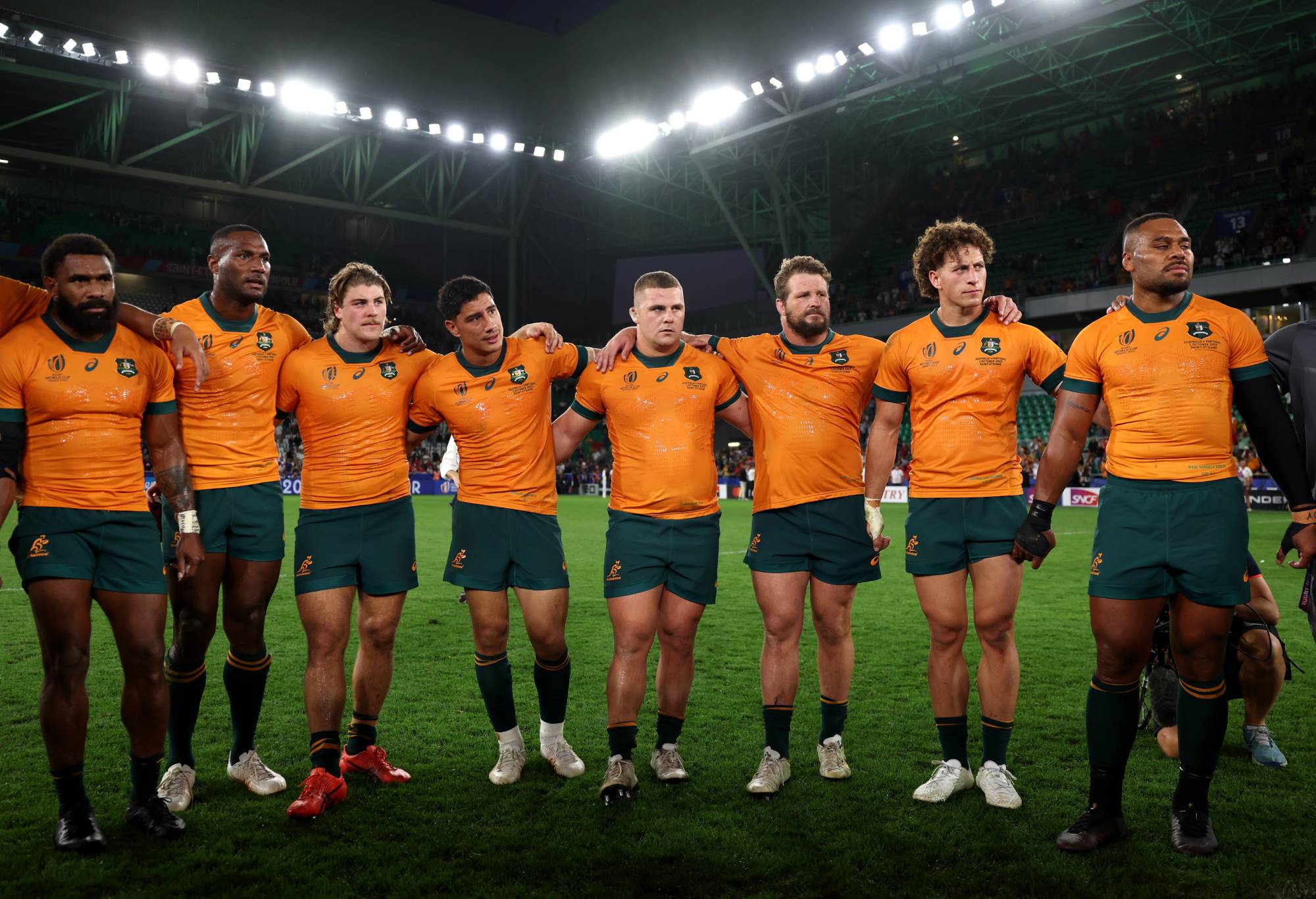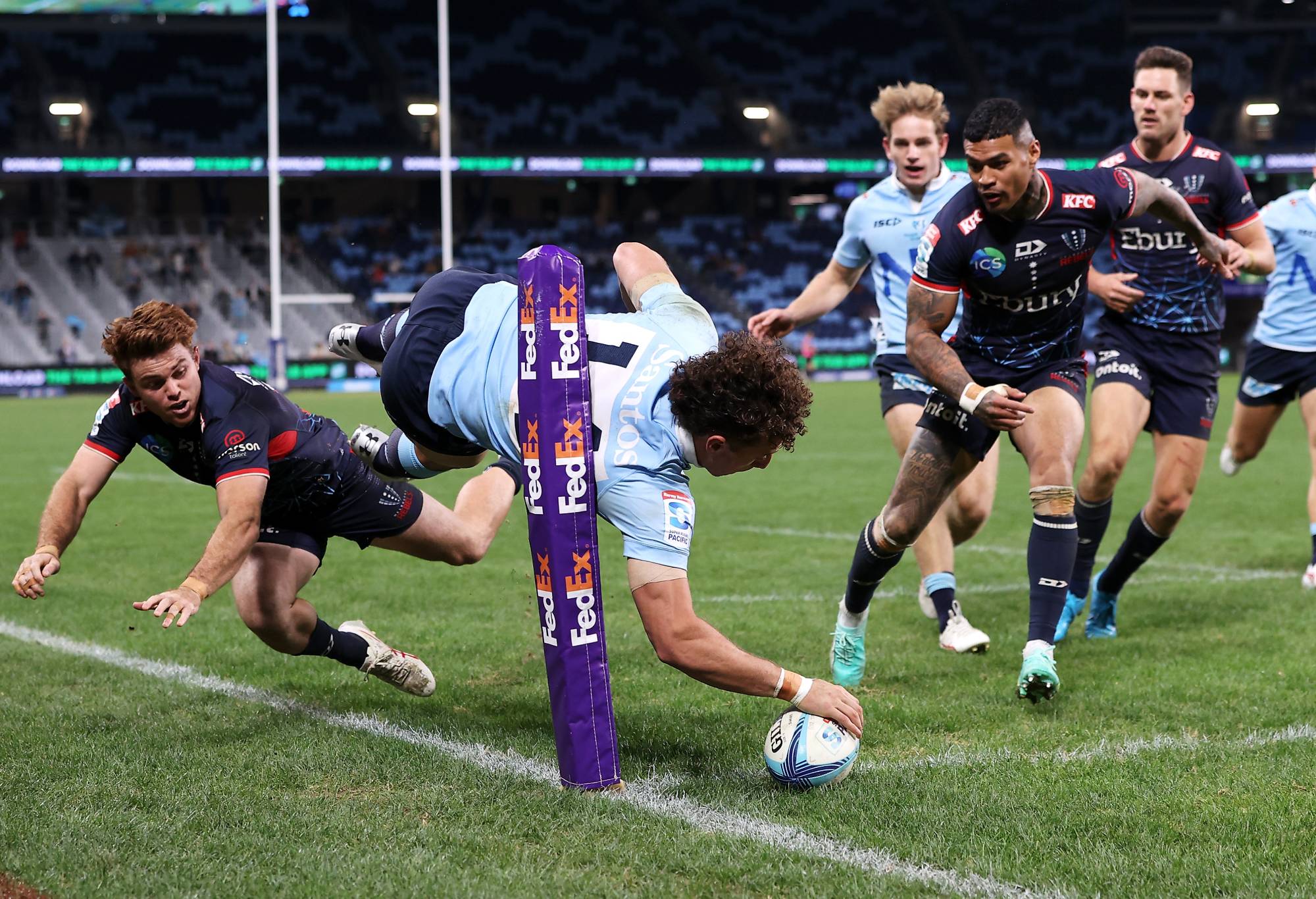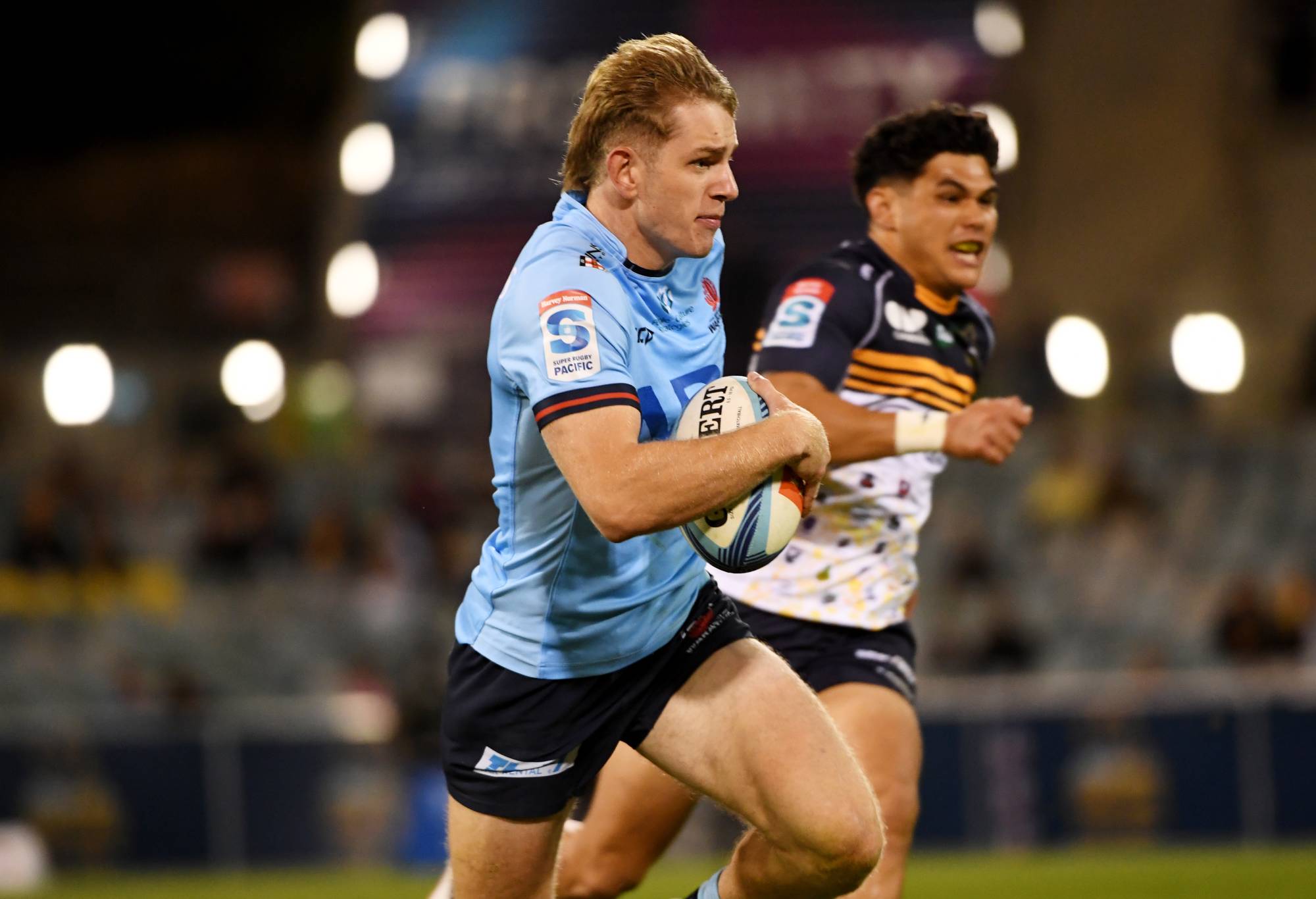Without a Wallabies head coach going into the new year, another change in leadership at Rugby Australia, and a big-name sponsor ending its three-year association with the game, you might be forgiven for thinking that the game is dying a slow death off the back of Australia’s historic World Cup pool exit and a two-decade Bledisloe Cup drought.
But according to Andrew Blades, who has recently stepped away from the sport after three decades in the game as a player, coach and head of rugby at a leading Sydney school, all hope is not lost. Far from it.
“In many ways it’s in much better shape than people think,” Blades told The Roar.
“It’s definitely been very tough, but it’s not dead like [rugby] league is trying to portray it is.
“We’re in a hugely competitive market, but we’ve got to go back to giving kids an opportunity to experience it and play it and see it because you can’t be what you can’t see.”
As many welcomed Eddie Jones’ remarkable return to Australian rugby at the start of the year as a huge moment in righting the wrongs and getting the ship back in the right direction for the sport, Blades was one who viewed his sudden and grand homecoming with an element of scepticism.

The Wallabies after their World Cup fixture in France. (Photo by Chris Hyde/Getty Images)
It wasn’t that the World Cup-winning Wallaby didn’t think Jones could coach. Blades knew he could, having worked with him at the Brumbies and Wallabies two decades ago.
But an incident on the 2004 end-of-season spring tour left Blades questioning Jones’ motivations and whether he was suited to Australian rugby in 2023.
“I’d spent a few years with him at the Brumbies and then I’d gone overseas to coach and was doing some stuff in the background for him, just some analysis and bits and pieces,” Blades said.
“He came to me about joining him back there. I did one season with him. Then we had a bit of a disagreement at the end of that season, and I walked away. It was just a typical Eddie thing.
“We actually had a really good season, we got six out of seven. And then in our final game, we prepped pretty badly for it. Afterward, he claimed that I’d been in cahoots with Bernie [Stephen Larlham] and George [Gregan] to change the game plan on him and all this crap. I just walked away on the back of that.”
Blades took no pleasure in the Wallabies’ struggles this year with Jones back in charge.
But the experienced coach, who also assisted Robbie Deans and Ewen McKenzie during their Wallaby tenures, believes Jones didn’t get his selection, nor game-plan right.
“It was just sad to see this year how things panned out,” he said.
“Obviously things were looking good in the World Cup year. In the end, probably by his design, [the Wallabies] didn’t fire a shot.
“He didn’t take the experienced players you need for a World Cup and then tried to play a style of game that you need experienced players for, so it was a bit of a disaster in the end, unfortunately. Now, we’ve just got to get on with it, pick up the pieces and move forward.”

Andrew Blades has stepped away from rugby after three decades at the top. But the World Cup-winning Wallaby says rugby in Australia is in better shape than first meets the eye. (Photo by Bryn Lennon/Getty Images)
Blades is well placed to comment on the health of the sport.
The former front-rower was part of Australian rugby’s glory years in the 1990s and started at tight-head prop in the Wallabies’ World Cup final triumph over France at Millennium Stadium.
As well as coaching at the top alongside three Wallabies coaches, Blades, who attended Killara High School, worked at St Joseph’s College Hunters Hill, before returning to the Waratahs as their general manager for the past two years.
Reflecting on Australian rugby’s slide, Blades believes the game rested on its laurels for too long and says the fact the game has generally been shown behind a paywall hasn’t helped.
“We just got very reliant on thinking that it was just going to keep happening and it was OK to be behind a paywall of TV and it’d all tick along,” Blades said.
“What we’ve found out now is that almost 30 years down the track we’ve had a whole couple of generations of kids grow up not seeing rugby on telly and you can’t sell a secret. If kids aren’t seeing it, they’re not becoming engaged or welded onto a team.”
While Blades has been hugely encouraged by Stan’s refreshing outlook on the game, he said it was vital they “get the balance right and get the free-to-air content onto mainstream more just to get those that wider reach”.
One of the huge concerns in recent times in Australian rugby is the supposed lack of talent coming through the system.
Where once the Wallabies were the envy of the world, they have fallen to ninth on the World Rugby rankings.
The falling reputation of Super Rugby hasn’t helped, with Australia’s last triumph in the competition in 2014.
At the same time, crowds have fallen off a cliff from what they were at the start of the century too.
With the NRL and AFL expanding and drawing strong crowds across the entire nation, rugby has become the ugly duckling in the fight for eyeballs across the winter Australian sports market.
RA’s broadcast deal of $29m a year barely makes a splash in the ocean.
The fact many, including Kayln Ponga and Luke Keary, have chosen league over union hasn’t helped.
It’s left RA, at times, throwing millions at the likes of Israel Folau and Joseph Suaalii to help build coverage and create success.
Blades believes there is enough talent emerging through the system but says the priority must be about keeping it.
“You’ve only got to see the 16s team for New South Wales that’s taken the field the last couple of years and the talented players there,” he said.
“The difficult thing is having the resources to keep those players in the game.
“There’s so many opportunities for those players to go and play elsewhere in other sports or other countries.
“We’ve definitely got the talent there, it’s a matter of how we keep them. How do we ensure rugby is one of the options to stay in rather than going, ‘Well, rugby’s not actually an option for me, there’s these three other options instead.’
“Everyone says, we haven’t got enough players for five teams. We’ve definitely got enough players in the system coming through. We haven’t had the resources to keep enough players to run five competitive teams is probably the better way of saying it.
“Whereas the other sports have been better resourced and able to attract those players away from us, and then you’ve also got players obviously getting sold to overseas clubs at a very young age.”
It’s for that reason Blades bemoaned RA’s decision to continue to withhold $1.7 million from the Super Rugby franchises, having kept the revenue as a means of staying afloat throughout the Covid pandemic, wasn’t helping, particularly after the Wallabies’ World Cup budget blowout.
“It’s definitely been difficult keeping the younger players in the game with the financial constraints, but I think that’s a matter of priorities and where people prioritise the money,” Blades said.
“I mean, we just spent more on a World Cup campaign than ever – any team ever has, probably – and taken that money out of the state and youth retention programs to do that, so we’ve only got ourselves to blame for that.
“RA needs to reinstate that [$1.7m], and more.
“Those young players want the ability to train semi-full time and be part of a proper program. The big thing is that reinstatement of that funding at that level, so it takes the financial pressure off the states, and they can actually fund those things properly and better support their own base system below them rather than just scrambling to survive.
“That’s the biggest [mistake] that this last year taught us is to pour millions upon millions of dollars into a Wallaby program and starve the base.”

Australia’s Super Rugby franchises have been without $1.7 million since the Covid pandemic. (Photo by Mark Kolbe/Getty Images)
Blades said RA’s decision was also, in part, to try and get the states to come “begging” so the governing body could “take control” and implement the centralisation reform measures they want.
While Blades was adamant that everyone recognised the need for greater alignment, he said that creating greater trust between the unions and national body, as well as building the base from within the unions was just as important.
“We definitely need alignment, and everyone’s in agreement with that,” he said.
“There’s no one that’s saying that we don’t need national alignment around contracting and a better system.
“What became evident was that Queensland and the Brumbies, and everyone, didn’t trust that if they agreed to what RA wanted at that point in time that it would be run well, and now that changes have been made, everyone agrees that has to be done, it’s just a matter of getting the getting the right people at the top running it to make sure that it works in everyone’s interests.
“They’ve also got to get back and redress the strength of what they do with the states and start building again and have a better long-term vision of what they want the game to be.”
Nonetheless, Blades said NSW Rugby was doing more than it was given credit for in spreading the game’s message, saying the state union had been spending between “$4 and $6 million a year on community rugby”.
“A lot of people say they don’t do anything. You’re like, well, you’re spending $6 million across a huge state like NSW, it probably gets washed out a fair bit,” Blades said.
“But they are doing a huge job and if they get more support around that and can build up those systems, we’ll have a really strong game.”
It’s why Blades was adamant that putting more money into the unions to spend on development officers to ensure talent gets found was crucial.
“A lot of them [schoolboy talent] are wrapped up early,” Blades said.
“To be honest, at the end of the day, they are budget-related decisions at the time where there was just no money to offer those players something or even to offer them an opportunity around a well-resourced system.
“Matty Evrard and Andrew Cleverley, who run the systems at New South Wales, they are seven-day-a-week guys who just go flat chat and they help run the CHS zone trials, they run everything, but there’s not enough of them on the ground to do it.”
He added that the NSW Positive Rugby Foundation had done a “huge job” in getting bodies back on the ground in regional Australia.
“If we could double what they’ve been able to do we’d still be wanting more. That’s definitely one part of it is there’s great growth happening there regionally,” Blades said.

Max Jorgensen turned down advances from the NRL to sign with the Waratahs. (Photo by Tracey Nearmy/Getty Images)
As for the school systems, Blades said private schools were doing an “outstanding job” but admitted that more needed to be done to encourage young kids to play the game.
“The public system has struggled where I came through there, there were loads of teachers who were willing to do the extra time and the comps were strong, but the world’s changed now,” he said.
“Those systems need a lot more artificial support from externals to keep going, which requires lots of resources.
“NSW has been doing a great job, with limited resources to try and breathe life and keep those things going, but that’s where we need to direct more resources into those levels, into that club land and into the school system to build that base back up there again, which has dropped off.
“One of the things that I do notice is that bit where the players used to watch rugby on a weekend, a lot of them are watching the league and stuff because it’s easier and it’s more accessible. We’ve got to challenge that. We’re not trying to beat league or anything, it’s just giving young people the opportunity to see the game and to play the game.
“Those two are the basic principles to experience what your sport has to offer and let them make a decision based on that. They’re the key things for me and that requires huge resources.”
He added that the “red tape” needed within schools to allow kids to play rugby had made it harder for boys and girls to pick up a ball.

Andrew Blades watches over a scrum during a Wallabies training session at Sydney Grammer School fields on August 21, 2014 in Sydney. (Photo by Matt King/Getty Images)
Despite the doom and gloom that’s engulfed the game in recent years, particularly the past six months, Blades said the fact so many travelled to France to watch the Wallabies and the anger that’s followed meant there remained a strong pulse if RA managed to get its ducks in a row.
“There’s definitely a latent support base when you see around 40,000 Aussies travel to France to watch the World Cup,” he said.
“There’s a lot of kids that love footy. The Shute Shield has still thrived to a degree because it’s got that club rivalry, it’s got that tribalism. Plus, the enjoyment of being part of a group. It’s still there.
“Nothing’s dead. I know it’s always [described] as the worst or the best because that’s the way you get promotion these days, to get anyone to listen, but there’s a lot of positives there and it’s just grabbing all of them and getting the right people in charge.
“Once we get away from the negative rhetoric that has been around the game for the last few years, there’s a huge amount of upside.
“There’s good people involved and there’s a lot of people that want to make it work. It’s just it’s going to be a tough few months because obviously there’s nothing to take the mind off the fact that the last thing everyone remembers is our World Cup performance. That’s the difficult bit.
“It’s just now looking forward and planning and trying to get things on the right footing and getting people talking positively, enthusiastically about the game they love this. The fact that people care, they’re talking about it now, that everyone’s a bit negative on the back of the World Cup, but it’s also showing that people actually give a shit about it. They just want something positive to grab hold of.”

































































































